-
 Art of Wellness Acupuncture & Traditional Chinese Medicine (TCM)11704 Wilshire Blvd, Suite 295, Los Angeles, CA, 90025
Art of Wellness Acupuncture & Traditional Chinese Medicine (TCM)11704 Wilshire Blvd, Suite 295, Los Angeles, CA, 90025
myartofwellness@gmail.com310-451-5522 Office Hours
MonClosedTue7:30 am --4 pmWed7:30 am --4 pmThu7:30 am -- 4 pmFri7:30 am -- 4 pmSat7:30 am -- 4 pmSunClosedOur office opens from Tuesdays to Saturdays 7:30 am to 4 pm, will be closed on Memorial day, Independent day, Labor day, Thanksgiving day, Christmas and New year.
-
Recent Posts
- How to Treat Dysautonomia With Acupuncture and TCM
- How to Treat Myofascial Pain Syndrome With Acupuncture and TCM
- How to Treat Costochondritis With Acupuncture and TCM
- How to Treat Ankylosing Spondylitis With Acupuncture and TCM
- How to Treat Gastroparesis With Acupuncture and TCM
- How To Treat Sleep Apnea With Acupuncture and TCM
- How To Treat Baker’s Cyst With Acupuncture and TCM
- How to Treat Sinusitis With Acupuncture and TCM
- How To Treat Sjogren’s Disease With Acupuncture and TCM
- How to Treat Raynaud’s Syndrome With Acupuncture and TCM
- How to Treat Autoimmune Disorders With Acupuncture and TCM
- Chinese New Year 2024 Year of the Dragon
- Sign up to receive news and updates and get my free report:“The Top 10 Reasons to Try Acupuncture”

Women’s Health
How to Treat Ovulation Pain With Acupuncture and TCM
By Xiaomei Cai, L.Ac., Ph.D. and Qineng Tan, L.Ac., Ph.D.
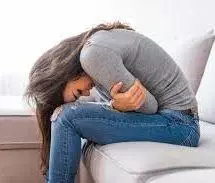
Cramping during ovulation, ovary pain, ovulation pain on one side? Ovulation cramps are very common. Acupuncture and TCM can help ease severe ovulation pain and help with all kinds of ovulation disorders.
The medical term for ovulation pain is “Mittelschmerz,” which means “middle pain” in German. The term Mittelschmerz syndrome refers to the fact that ovulation cramps occur in the middle of the menstrual cycle, typically about 14 days before the next menstrual period.
Studies have suggested that 35-50% of people who ovulate experience cramping during ovulation. Other ovulation symptoms include:
- Ovulation pain on one side
- Pelvic pain, abdominal pain
- Dull ache or sharp twinge of pain in pelvis
- Vaginal pain during ovulation, vaginal cramps
- Cervical cramps, cervix cramps, cervical pain
- Pain around or near the tailbone, tailbone pain
- Back pain, hip pain, or rib pain
- Bloating, bloated stomach
- Fatigue
- Breast tenderness
- Mood swings
- Spotting
- Nausea
- Diarrhea
- Lack of appetite
The process of ovulation involves luteinizing hormone (LH) stimulating follicles on the ovary to mature then break free from the ovary and move through the fallopian tube.
Follicles are like small cysts which stretch the surface of the ovary and then rupture. Blood and other fluids may be released, and this may be part of what causes pelvic pain during ovulation.
Estrogen levels are usually at their highest at the time of ovulation, which can contribute to water retention and uncomfortable bloating in the pelvic area.
For people who are trying to get pregnant, ovulation pain and fertility—or ovulation pain and pregnancy success—may seem related, because the cramping lets them know when they are most fertile.
Many people never notice any signs of ovulation if they aren’t specifically watching for them. For some, ovary pain during ovulation is a sharp cramp that only lasts a few minutes, or a few hours. For others, ovulation pain and pelvic cramps can be so severe that they are debilitating.
Acupuncture and TCM treatment can help relieve ovulation cramps and help regulate hormones to alleviate other ovulation symptoms and problems, as well.
What Causes Ovulation Pain?
Why do some people experience more severe ovulation pain than others? Medical science has not determined exactly why some people experience pain during ovulation and others don’t.
Sometimes ovulation pain can be so bad that people go to the emergency room. In this case, doctors will want to rule out other possibilities. Many conditions can cause pelvic pain, including:
- Appendicitis
- Constipation
- UTI
- IBS
- Celiac disease
- Interstitial cystitis
- Kidney stones
- Gallbladder attack
- Ulcer
- STIs
- Bowel obstruction
- Hernia

Pelvic pain that is related to the reproductive organs can include:
- Menstrual cramps, PMS, dysmenorrhea, painful periods
- Ovarian cyst, ruptured ovarian cyst, twisted ovarian cyst
- Endometriosis
- Uterine fibroids, leiomyoma of the uterus
- Pregnancy
- Ectopic pregnancy
- Pelvic inflammatory disease
- Scar tissue in the pelvic area
- Cancers of the reproductive organs
These conditions not only cause pain, but may interfere with fertility if and when you are ready to conceive.
Endometriosis Ovulation Pain or Ovarian Cyst Pain?
Ovary pain may be related to other issues, apart from ovulation.
Some women begin to experience more ovulation pain when they are going through perimenopause, due to changing estrogen levels.
Ovarian cysts—sacs filled with fluid that develop on the ovaries—are very common. These usually form during ovulation and then go away on their own. However, in some instances, they grow larger, and can cause considerable pain.
Signs of ovarian cyst may be a constant ache, or one that comes and goes, or sudden, sharp pains that happen occasionally. Other ovarian cyst symptoms include: bloating, swelling, and pressure in the pelvic area. If the cyst ruptures, there may be a very sudden, severe pain on one side, and if the cyst becomes twisted or torqued, there may be severe pain accompanied by nausea or vomiting.
Polycystic ovarian syndrome (PCOS) is a hormonal condition in which a person does not ovulate regularly. In many cases, lots of small cysts form on the ovaries, which can cause bloating and pelvic pain.
Ovulation pain can be differentiated from PCOS or ovarian cyst pain mainly by the fact that it occurs only during a specific window of time during the ovulation cycle. If you are using a fertility calculator (ovulation calculator) to track your cycle, then you may be more aware of how your ovulation cycle works and when your fertile window is going to occur.
Endometriosis is a condition in which uterine lining tissues develop in other areas of the body, particularly on the ovaries and fallopian tubes. One of the primary symptoms of endometriosis is pelvic pain, which can be severe and happen at any time during the menstrual cycle. Some people report increased pain during ovulation, as well as severe menstrual pain.
Endometriomas (also known as “chocolate cysts”) can develop in and around the ovaries. There can also be scar tissues, or adhesions, around the ovaries. These tissues may contribute to the increased pain ovulation can cause when you have endometriosis. In these cases, the pain may radiate to other areas, even down to the thighs. Having sex may also be painful around the time of ovulation.
It is important to consult with a health professional if you are experiencing ovary pain, vaginal pain or severe menstrual pain.
PCOS and endometriosis not only cause pain and other uncomfortable symptoms, but can lead to infertility.
If your periods are irregular, or you have reason to suspect that you are not ovulating, it is important to seek health care. Severe pain or missed periods may be sending a signal that there is a deeper issue that needs to be addressed.
Treatment for Ovulation Pain
Ovulation pain may not occur every month. Some people may get relief from occasional ovulation pain by taking over the counter pain relievers like ibuprofen.
If ovary pain is happening frequently and is unbearable, a doctor may recommend hormonal birth control, like oral contraceptives or the Nuvaring. These birth control methods suppress ovulation, and therefore prevent mittelschmerz. However, hormonal birth control can have other negative side effects, and is not suitable for those who may be trying to get pregnant.
Can Acupuncture Help Ovulation Pain?

In TCM, we see ovulation as being a transition from Yin dominant energy to Yang dominant energy. The Yin energy has built up to the point when the egg is released, then Yang energy warms the uterus to prepare it for potential conception.
If there is stagnant Qi (life force energy) in the organ systems, this can cause the intense cramps some people experience during ovulation.
Acupuncture treatment, herbs, and the right nutrition can help move Qi and blood. The smooth flow of Liver Qi, in particular, is essential to not only enhance fertility, but to help ovulation and menstruation occur without blockages that cause pain.
Acupuncture and Chinese herbs have been shown to help relieve all types of gynecologically related pelvic pain, including endometriosis pain, menstrual pain, and period back pain.
Acupuncture treatment has a natural effect on the key hormones involved in follicle development, ovulation, and menstruation: estrogen, progesterone and prostaglandins. Balancing these hormones can help to regulate ovulation when it is not occurring, and also to help relieve cramps, tension, and other symptoms.
Top 3 Acupressure Points for Ovulation Pain
Here are some acupoints for ovulation cramps that you can use to help relieve pelvic pain.
- “Sea of Qi” CV6 – 1-2 inches below belly button, massage in a circular motion for at least a minute
- San Jiao Jiu CA6- 2 points that make a triangle with the navel, press firmly
- Zigong Ren Channel 3 – 4-5 inches below the belly button, press firmly for a minute
Acupuncture Near Me for Ovulation Pain
Whether you are experiencing monthly ovulation cramping, not sure when or if you are ovulating, or suspect that you may have PCOS, endometriosis, or fibroids, TCM and acupuncture offer a highly effective alternative treatment for gynecological issues. The doctors at Art of Wellness are highly respected experts when it comes to fertility treatment and women’s health. Their unique knowledge of Western gynecology and obstetrics combined with TCM allows them to work with you and your individual situation.
*This article is for education from the perspective of Traditional Chinese Medicine only. The education provided by this article is not approved by FDA to diagnose, prevent, treat and cure human diseases. It should not stop you from consulting with your physician for your medical conditions. Traditional Chinese Medicine is based on Qi, which is an invisible force that usually cannot be observed by modern science. Because science focuses on testing ideas about the natural world with evidence obtained through observation, these aspects of acupuncture can’t be studied by science. Therefore acupuncture and Chinese herbs are often not supported by double-blind, randomized trials, and they are considered alternative medicine therapies in the United States.
How to Treat Dysmenorrhea With Acupuncture and TCM
By Xiaomei Cai, L.Ac., Ph.D. & Qineng Tan, L.Ac., Ph.D.
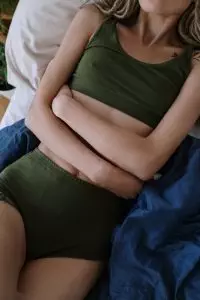
Menstrual cramps, unbearable period pain? Severe period cramps and period back pain are dysmenorrhea symptoms. Acupuncture and TCM offer a way to help with cramps and provide period cramp relief.
About 80% of women report having menstrual cramps and painful periods at some point in their lives. Over 40% of women regularly experience PMS cramps, or cramps before period. For some women, the pain is mild enough to tolerate. For others, severe period cramps are truly debilitating, leading to missed days of school or work.
Primary dysmenorrhea is when the period cramps are a result of prostaglandins (hormones) causing the uterus to contract forcefully to expel its lining. For some people, this action leads not only to pelvic pain, but can radiate to cause severe lower back pain, hip pain, or even pain in the legs.
Secondary dysmenorrhea is when severe menstrual cramps are related to another condition, such as endometriosis, uterine fibroids, or pelvic inflammatory disease (PID). About 1 in 10 women between the ages of 15-49 experiences endometriosis, which can cause excruciating pelvic pain during period, and negatively impact fertility. As many as 60-80% of women have fibroids, although many do not know it.
The severe period cramps may feel like a constant ache in the lower abdomen, or more like a gripping or throbbing pain that comes and goes.
Acupuncture and TCM offer an alternative way to treat period cramps and get period pain relief.
Top 5 Dysmenorrhea Symptoms
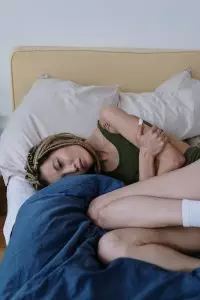
In addition to menstrual cramps and back pain during the period, some women experience other symptoms of dysmenorrhea, including:
Some women also experience vaginal cramps or ovary pain during period. This may be due to inflammation or scar tissue around the ovaries or ovarian cysts swelling.
How to Help Period Cramps
Generally, doctors will treat dysmenorrhea OTC pain medication, or NSAIDs like Ibuprofen, to relieve menstrual cramping due to primary dysmenorrhea. They may prescribe hormonal birth control, such as oral contraceptives (birth control pills), birth control patch, birth control implant, injection, or vaginal ring.
Hormonal birth control helps relieve period pain because it blocks ovulation and reduces the amount of prostaglandins being produced. However, this medication is not particularly helpful for those who may wish to get pregnant, or those who experience unpleasant side effects from birth control.
Possible Side Effects of Hormonal Birth Control
Many people may find that hormonal birth control causes side effects such as:
Potentially serious side effects may be more common the older a woman is, or the longer she remains on birth control; these could include: blood clots, gallbladder disease, heart disease, or even stroke.
If severe menstrual cramps are not relieved with pain medication, further investigation may be done to determine if there is some other condition causing pelvic pain.
Endometriosis is also usually treated with pain medications and contraceptives, or with Nupron, which suppresses the period. In severe cases, surgery may remove the patches of endometrial tissues. However, with both of these treatments, the endometriosis and severe period pain often come back.
Birth control, pain medications, and even surgeries may temporarily reduce painful cramps, but they are only masking the deeper problems. TCM and acupuncture can help get rid of menstrual cramps because they address the root cause of the pain.
Can Acupuncture Help Get Rid of Period Cramps?

In TCM, we look at organ systems as working together in harmony. Pain usually occurs because there is some imbalance in one or more of the major organ systems. Dysmenorrhea is usually considered to be related to Qi and/or blood stagnation, and often a deficiency of the kidney, liver, or both. In TCM, the liver controls the storage and distribution of blood, so it is central to the process of menstruation.
Dampness and cold are pathogenic forces that can be disruptive to the smooth flow of Qi related to menstruation. Being in a cold, damp place or eating too many cold or damp foods can cause blood stagnation in the abdominal area that leads to painful cramps.
Emotions can also play a significant role, as in TCM we see feelings of anger or depression causing liver stagnation. Deficiency of Qi can happen when a woman has gone through a lot, emotionally and physically, possibly through giving birth, or having stresses put on the reproductive organs.
Scientific research has shown that acupuncture has an effect on the production of key hormones like serotonin, estrogen and progesterone. When we use acupuncture points to balance the function of the liver, kidney, and other organ systems, these chemical changes occur naturally. We also use herbs to get vital nutrients into the blood that we can’t get from food.
Acupuncture is effective for treating conditions like endometriosis, uterine fibroids, and PCOS, as well.
Acupuncture treatment and herbal remedies for endometriosis and fibroids have been shown to reduce prostaglandin levels, which helps to relieve painful cramping and also to regulate cycles.
A study of endometriosis patients with dysmenorrhea who received electroacupuncture, the cure rate was 94.4% with low recurrence at the one-year checkup. Another study found that auricular acupuncture was effective 91% for mild to moderate menstrual pain.
TCM herbal formulations have been shown to be highly effective at relieving period pain. They work on the TCM principles of removing blood stasis to reduce swelling and relieve painful cramps.
When we are working to influence the menstrual cycle—in this case, to relieve painful cramping—it is usually best to have acupuncture treatment regularly for about three months. This way, we have time to balance the hormone fluctuations that occur during each phase of the cycle.
Top 3 Tips for Natural Relief from Period Cramps
Your acupuncturist can help give you personalized nutrition advice to help with your unique situation. Most people who are having trouble with painful periods can help themelves by trying these tips:
- Get more Omega-3 fatty acids in your diet – good natural sources include fish, flax seeds, and walnuts. You can also try taking fish oil, cod liver oil, or a vegan omega-3 supplement.
- Reduce consumption of ice-cold foods and beverages – icy drinks, ice cream, and raw foods can all cause a cooling of the uterus, which contributes to painful cramps.
- Avoid mucus-producing foods – foods that are more difficult to digest lead to mucus and stagnation in the organs. Reduce fatty foods, fried foods, and red meat.
Acupuncture Near Me for Dysmenorrhea in Los Angeles, Santa Monica
TCM has been used to treat menstrual difficulties and all types of gynecological issues for many centuries. The doctors at Art of Wellness in West L.A. bring special expertise in both TCM and western medicine gynecology and have partnered with the top women’s health and fertility specialists in Los Angeles. We have over 30 years of experience helping people regulate their menstrual cycles and experience more comfortable periods.
*This article is for education from the perspective of Traditional Chinese Medicine only. The education provided by this article is not approved by FDA to diagnose, prevent, treat and cure human diseases. It should not stop you from consulting with your physician for your medical conditions. Traditional Chinese Medicine is based on Qi, which is an invisible force that usually cannot be observed by modern science. Because science focuses on testing ideas about the natural world with evidence obtained through observation, these aspects of acupuncture can’t be studied by science. Therefore acupuncture and Chinese herbs are often not supported by double-blind, randomized trials, and they are considered alternative medicine therapies in the United States.
How to Detox With Acupuncture and TCM
By Xiaomei Cai, L.Ac., Ph.D. & Qineng Tan, L.Ac., Ph.D.
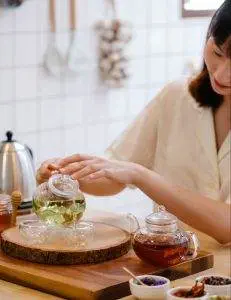
Why is it important to do a detox or body cleanse periodically? When done with the right support from an acupuncturist near me, detoxing can help improve your digestion, immune function, fertility, and many other aspects of your health. Store bought colon cleanse products or a juice cleanse won’t really do the job, though. A detox program with acupuncture and Chinese herbs will do more to optimize your health than just a detox diet will.
When we recommend our Detox Program at Art of Wellness, we are not talking about fasting or detox drinks, like a master cleanse. The goal of our program is to detoxify the organ systems of the body: it’s a liver detox, kidney cleanse, lungs, heart, and spleen. This is a full body cleanse designed to give you a health reset. According to TCM philosophy, your body knows how to repair and renew itself, but it cannot do this job when it is congested and out of balance.
In TCM, we have a broad concept of what “toxins” are and how they can affect our bodies and our health. Toxic chemicals that come from our environment, such as food additives, pesticides, cleaning products, and beauty and hygiene products are certainly part of the problem. Drugs, medicines, alcohol, and unhealthy foods can also be toxic. So can behavioral habits, like sitting and looking at our screens and devices too long.
But our own bodies produce toxins, too. The waste products our organs create are “toxic,” and if they are held in the body too long without being adequately cleared out, they can negatively impact organ function. Imbalances in the system can cause conditions of excess heat or phlegm, which can lead to all kinds of problems with both your physical and mental health.
Stress, lack of sleep, and extreme emotions can also contribute to toxic conditions in the body and mind. When the organ systems are out of balance, the body is under constant pressure to keep functioning, but we do not feel our best.
Signs you need to detox include:
- Fatigue, low energy, tired all the time
- Foggy head, memory problems, trouble concentrating
- Constipation
- Trouble sleeping, insomnia
- Weight gain
- Hair loss
- Hormone imbalances
- Signs of rapid aging
- Skin rash, acne
- Fingernails are brittle, lined or ridged
- Severe PMS symptoms or menopause symptoms
- Headaches, migraine
- Water retention, edema, swelling in extremities
Inflammation is largely created by toxic conditions in the body, and most pain conditions and chronic illnesses stem, at least in part, from inflammation somewhere.
Why You Need a Liver Detox
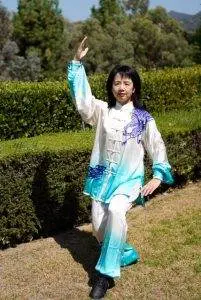
In conventional medicine, we think of the liver as being a sort of filter that removes toxins from the blood and helps metabolize fat. In TCM theory, we consider the liver to be the storehouse and distributor of blood; therefore, it also plays a crucial role in the menstrual cycle. The liver is also strongly connected to a person’s emotional life.
Stress, lack of sleep, too much sugar, alcohol, fatty, fried foods, pharmaceutical medicines, and recreational drugs all tax the liver above and beyond what it needs to do just to keep the blood flowing to nourish the body. When too many demands are placed on the liver, it can cause all kinds of symptoms, including: fatigue, insomnia, and headaches. Feelings of anger, frustration, anxiety, and irritability may arise. Conversely, when a person is feeling bitter and resentful, and isn’t able to express it, those unresolved emotions may begin to cause trouble with liver function.
Just as the liver governs the blood, in TCM, the kidneys govern the water of the body, controlling elimination through the bladder, and maintaining blood pressure by keeping the right amount of water in the bloodstream. Signs that the kidneys are not balanced include: problems with blood pressure, edema, puffiness in the face or extremities, UTIs, chronic fatigue, and menopause symptoms, like dryness and hot flashes.
Detoxing the organ systems, including the liver and kidneys especially, can help rejuvenate the digestion and allow better nutrition to reach all parts of the body, as the quality and flow of blood and other bodily fluids will be improved.
Making sure that your excretory system is in good working order before starting a cleanse is important. If you are already having problems with constipation, for example, we will want to make sure we get things moving before we start cleansing the organs. Our detox also focuses on the body’s largest excretory organ: the skin.
Top 10 Reasons To Detox
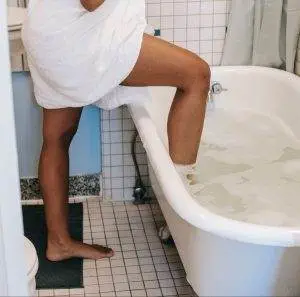
It is a good idea for everyone to detox periodically; detoxing every six months is reasonable for most people. Sometimes we will specifically recommend a detox for a patient when they are struggling with a particular health problem, or if they are planning a pregnancy.
Detoxing can help:
- Boost Immunity – a cleanse will help get your lymphatic system, which produces and transports immune cells and removes waste from cells, moving, improving the efficacy of your immune system.
- Break Free From Addiction – if you are ready, a commitment to the detox program and food plan can help you end patterns of substance abuse, drug use, alcohol addiction, smoking, and other types of dependency.
- Infertility – We often advise people who come to Art of Wellness for fertility treatment to begin with the Detox Program. Not only will this help increase the chances of conception occurring, whether naturally or with the aid of ART, but it will also lay the foundation for your child’s health in the future.
- Improve sleep – This works both ways. In order for the body to do its routine daily work of removing toxic waste, it needs plenty of sleep. The Liver, in particular, is working hard through the night to clean and deliver fresh blood to the cells. Sleeping on your side enhances your body’s ability to do this work, allowing the internal organs to drain properly. When your body is functioning well, your sleep will be of better quality, more restful and refreshing.
- Improve skin and hair – Dull eyes and skin, dark circles or bags, puffiness, and thinning hair are signs of stagnant blood and Qi. Nutrients from the right foods and Chinese herbs help to nourish the skin, and clear heat, dampness, and dryness. When old cells are removed, hair and eyes can shine again. Acupuncture treatment can help stimulate collagen production, which also happens while you sleep.
- Weight loss – While our acupuncture detox is not about how to lose belly fat fast, many people will find that it gives them a good foundation for new eating habits. Detoxing the liver and kidneys will help your body metabolize fat better.
- Balance hormones – severe PMS symptoms, bloated stomach and mood swings, perimenopause symptoms, infertility in women and infertility in men (oligospermia) can all be improved when hormone function improves. Acupuncture treatment can also help relieve conditions like PCOS, fibroids/leiomyoma, and endometriosis for women, and BPH in men.
- Reduce inflammation – many illnesses and pain conditions are inflammatory in nature. If you are suffering from pain due to plantar fasciitis, gout, rheumatoid arthritis, tennis elbow, carpal tunnel syndrome, shoulder or hip pain, acupuncture can help.
- Increased energy – better nutrition, better circulation, better sleep, and better organ function will all work synergistically to help you feel more energetic.
- Chronic illness – many chronic illnesses are rooted in toxic conditions within the body or exposure to toxins. Hard-to-treat conditions like autoimmune conditions and other systemic problems may be helped with alternative medicine when conventional medical treatments have not been successful. We treat many conditions with acupuncture and herbs, such as: lupus, lyme disease, celiac disease, fibromyalgia, and Crohn’s disease. We also provide support for people going through cancer treatment.
7 Steps of Detox Program With TCM Acupuncture and Herbs
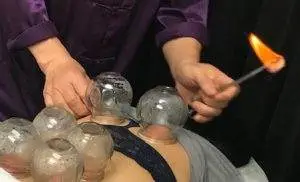
Pain and dysfunction occur when there is imbalance and when there are areas of stagnation within the body. Think of the metaphor of a house that needs to be deep-cleaned; there are dark corners of the body that have been ignored for a while, where dust and cobwebs have gathered. The Detox program reaches into these pockets of stagnation, sweeps them clean, and makes sure they get some fresh air and sunlight shining on them, in the form of invigorated Qi and blood.
- Acupuncture Treatments – the primary goal of acupuncture treatments during the detox phase is to get Qi moving freely, remove blockages, and to assist in elimination of toxins from the body.
- Cupping Treatment – the TCM modality of cupping creates a vacuum-like suction that moves Qi and blood from the innermost parts of the body outwards. During the detox program, cupping helps to pull toxins out of the lungs and other organs.
- Detox Herbs – the Chinese herb detox tea helps to clear heat and toxins from the body and improve digestion and elimination.
- Foot Pad Detox – detox foot patches, worn as you sleep at night and removed in the morning, help to pull toxins and fatty deposits from the body.
- Detox Bath – Sweating is an excellent way to remove toxins through the skin; this is why so many traditions rely on saunas and hot baths. Our herbal sachets allow you to enjoy a therapeutic herbal soak in your own bathtub.
- Exercise – Your acupuncturist will instruct you on how to practice daily exercises, based on QiGong movements, that will help to get Qi and blood moving.
- Nutrition – the food plan during the detox is based on whole grains, lean proteins, and plenty of vegetables, flooding your system with nutrients.
Detox Near Me Los Angeles, Westside
The beginning of the year, springtime, after recovery from a long illness, while preparing for a healthy pregnancy–anytime may be the right time for you to detoxify your system and get a fresh start. We recommend that you take the time to dedicate yourself to a week of cleansing with the Art of Wellness Detox Program at least twice a year for optimal health benefits.
*This article is for education from the perspective of Traditional Chinese Medicine only. The education provided by this article is not approved by FDA to diagnose, prevent, treat and cure human diseases. It should not stop you from consulting with your physician for your medical conditions. Traditional Chinese Medicine is based on Qi, which is an invisible force that usually cannot be observed by modern science. Because science focuses on testing ideas about the natural world with evidence obtained through observation, these aspects of acupuncture can’t be studied by science. Therefore acupuncture and Chinese herbs are often not supported by double-blind, randomized trials, and they are considered alternative medicine therapies in the United States.
How to Treat PMS With Acupuncture and TCM
By Xiaomei Cai, L.Ac., Ph.D. & Qineng Tan, L.Ac., Ph.D.
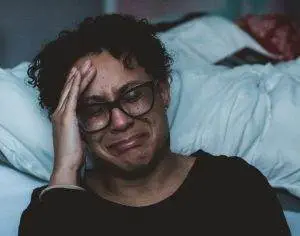
Monthly mood swings, bloated stomach, headaches, and weight gain. Why is PMS so bad? Premenstrual syndrome (PMS) is a set of symptoms that occur in the days before a woman gets her period. PMS symptoms affect every woman differently, and can be serious enough to disrupt your life every month. TCM is an effective way to deal with PMS, because acupuncture treatment can help relieve both physical and emotional symptoms of PMS and severe PMS, also known as PMDD (premenstrual dysphoric disorder).
To say that PMS is common among women is an understatement. The vast majority of women experience some changes in both their mental health and their bodies the week before their period starts. Whether or not a woman feels that it has a negative impact on her daily life may change over time. For some women, PMS isn’t a big deal; for others, it’s a major problem that can affect their relationships, impact their work, and make life hell every month.
Most women find their own particular pattern of PMS is somewhat predictable–until it isn’t. One of the most frustrating aspects of menstrual problems is the sense that things change without warning, and symptoms can come on suddenly with ferocious intensity. It can be difficult to describe how you feel before your period, because the symptoms seem to come and go. Some women find that their PMS symptoms are different from month to month. In some cases, they might find that every other month is bad, while the alternating months aren’t so bad. Why is PMS worse some months?
Other than the basic understanding that PMS is caused by fluctuations in hormones and brain chemistry, conventional medical science does not offer much in the way of clear answers about what causes PMS.
TCM provides a different framework for looking at menstrual problems and has been used to treat women’s health issues of all kinds for many centuries. TCM treatments including acupuncture, acupressure, moxibustion, and Chinese herbs can not only help relieve PMS symptoms, they can also be beneficial for other menstrual problems like irregular periods, PCOS, painful periods, endometriosis, heavy periods, fibroids, and symptoms of perimenopause.
Top 10 Symptoms of PMS
As a syndrome, PMS is considered a collection of symptoms that often appear together, in various combinations in different individuals. In the case of PMS, a woman may feel that her own symptoms change as often as every month, or gradually over the course of years. Girls in their teenage years may experience PMS in one way. Then, a woman in her early adult years may develop a different set of symptoms. After having a baby, a woman may find that her PMS symptoms have changed again. Then, many women in middle age experience changes in PMS symptoms as they go through perimenopause, approaching menopause. The most common signs of premenstrual syndrome include:
- Mood swings, low mood, feelings of sadness or anger
- Anxiety, feeling tense and irritable, cry easily or lose temper, want to be left alone
- Trouble sleeping, insomnia, disturbed sleep
- Breast tenderness, sore breasts, swollen breasts
- Food cravings, changes in appetite
- Weight gain, stomach bloating, water retention, pelvic pressure
- Gassiness, changes in digestion and elimination
- Acne, skin problems
- Changes in libido
- Headaches, migraines, difficulty concentrating, foggy head
Less obvious or well-known symptoms of PMS include: vision problems, tingling in the arms or legs, lack of coordination (clumsiness, dropping things), bruising easily, heart palpitations, dizziness, itchy skin, cold sores, toothaches, back pain, joint pain, and increased TMJ jaw pain.
Other health problems can be amplified during the premenstrual period, such as: chronic fatigue syndrome, fibromyalgia, interstitial cystitis, migraines, IBS, Meniere’s disease (dizziness, vertigo), clinical depression and anxiety disorders.
The physical and emotional aspects of PMS can affect each other, causing the typical mood swings. Feelings of sadness and frustration, or lack of sleep, may lead to comfort eating, but then the sight and sensation of your bloated stomach can cause you to feel depressed about your body. Minor problems with your spouse or co-workers can suddenly seem overwhelming and make you feel angry or helpless.
For some women, PMS symptoms are so bad that they feel unable to function the week before their period. Severe PMS is now diagnosed as PMDD.
What Is PMDD?
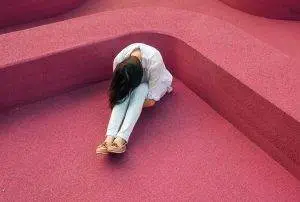
PMDD (premenstrual dysphoric disorder) is a severe form of PMS marked by intense emotional symptoms that dramatically impact a woman’s life, in addition to physical symptoms. “Dysphoria” is the opposite of “euphoria;” in other words, it is a mental state characterized by profound unhappiness and negative feelings. It is estimated that about 5% of all women experience this extreme type of PMS. Signs of PMDD include:
- Severe anxiety, panic attacks, paranoia
- Severe depression, in some cases even suicidal thoughts, lack of self-worth
- Anger and irritability that provokes rage and causes conflicts with other people
- Fatigue, low energy, inability to concentrate, feelings of confusion
- Intense food cravings, possibly leading to binge eating
Again, there is currently no scientific answer for what causes PMDD, although it is generally believed to be related to the way estrogen levels and progesterone levels change between ovulation and the onset of the menstrual period. Mood is considered to be related to serotonin levels in the brain, and this is why PMDD is usually treated with birth control pills, which suppress ovulation, and/or antidepressants (SSRIs), which affect serotonin uptake.
Medical Treatment for PMS
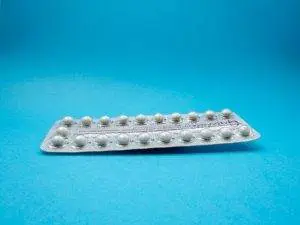
Naturally, when a woman asks for advice about PMS or PMDD, she is going to hear suggestions like: “try meditating, exercise more, eat a healthy diet, and get more sleep.” And it is true that making good lifestyle choices is an important part of helping to reduce PMS symptoms. But women who are suffering with serious PMS need solutions beyond these kinds of lifestyle guidelines.
When women complain of PMS symptoms, doctors will most often recommend OTC pain medications like ibuprofen or acetaminophen (NSAIDs) to relieve pain. Diuretics may be used to relieve bloating or premenstrual weight gain. Of course, most commonly, women are prescribed oral birth control pills, which suppress ovulation, and therefore may reduce the severity of PMS symptoms. More and more frequently, women may be prescribed antidepressants to try to deal with emotional symptoms and mood swings, or anxiety medications to take as needed during PMS. In effect, doctors often treat PMS the same way they would depression or anxiety.
Clearly, birth control pills are not helpful for women who may want to get pregnant, and some women may be concerned about how taking the pill or antidepressants may affect their fertility in the future. None of these pharmacological solutions for PMS address the root cause of the symptoms, and all of these medications carry side effects that may impact a woman’s overall health. Health care for women with TCM seeks to address the deeper internal causes of hormonal imbalances and other problems with the organ systems that are impacting the health of the ovaries and the regularity of the menstrual cycle.
Can Acupuncture Help PMS?

While it is only in recent years that conventional medicine has begun to acknowledge connections between physical health and emotional health, TCM has understood for many hundreds of years that health conditions of all kinds, especially those related to the menstrual cycle, are rooted in the balance of energies. Menstruation represents an ongoing process of transformation that occurs not only within the reproductive organs, but which affects every part of a woman, and even the people around her.
The concept of Yin and Yang in Chinese philosophy describes two opposing yet complementary forces that are constantly acting upon each other in order to achieve balance. The menstrual cycle is very much based on Yin and Yang energies; during the follicular phase of the cycle (before ovulation), Yin is increasing while Yang is decreasing, and in the luteal phase (after ovulation, before the period), Yang is increasing while Yin is decreasing. The system is designed, naturally, to create the right conditions for conception; this process of Yin and Yang exchange is what determines a woman’s fertility.
While the health of the uterus and ovaries is definitely central to the process, within the TCM philosophy, they are not the only organs involved with menstruation. The Kidneys, Liver, and Heart all have important roles to play, as well. In TCM, we also view the elements of Fire–to provide warmth, controlled by the Heart–and Water, controlled by the Kidneys–to provide moisture, as being vital to all processes within the body, especially to menstruation. Blood is cleansed, stored, and then distributed to the other organs by the Liver. Blood being central to the process of menstruation, the Liver’s role is really key in how the whole thing plays out.
According to TCM theory, most PMS and PMDD symptoms are caused by problems with Liver Qi. When the Liver Qi is out of balance, it can lead to feelings of anger, frustration, depression, and irritability. The Liver system is particularly susceptible to negative effects of stress.
There are a few different variations of Liver Qi imbalance and other patterns that can contribute to PMS symptoms:
- Liver Qi invasion – This is a condition of excess, in which there is too much rising Liver Qi, characterized by overall negative emotions that are disruptive, including anger and anxiety, breast tenderness, headaches, dizziness, and constipation.
- Liver Qi depression – In this case, there is not enough Liver Qi, causing feelings of sadness, heaviness in chest, painful swelling of breasts, sighing, bloated stomach, lack of appetite, cramping during period, scanty blood during period.
- Spleen Kidney deficiency – In this case, stagnant energy in the Kidney system is preventing water from moving appropriately, causing water retention or edema.
From the scientific medical standpoint, acupuncture treatment has been shown to have a positive effect on neurotransmitters like serotonin, and to impact levels of estrogen and progesterone. This happens naturally because we are using TCM methods to restore optimal function of all the organs. With Chinese herbs we are able to get specific nutrients into the body that we cannot get from the foods we normally eat.
Acupuncture treatment accompanied with specific herbs for PMS patterns can help balance the liver Qi, and bring all of the organs into synergistic harmony.
In order to make lasting change, it is best to have acupuncture treatment at least once or twice a week. We need to deal with each phase of the menstrual cycle as it occurs by tailoring the acupuncture treatment and herbs to your PMS and period symptoms.
A systematic review of ten controlled trials using acupuncture to treat PMS concluded that TCM treatment of PMS significantly improved symptoms.
Top 3 Tips for PMS Relief From TCM Perspective

There are still a lot of taboos surrounding women’s health, and many girls and women have never learned how to take care of their reproductive health. Working with an experienced TCM doctor will enable you to get personalized care and advice about how to eat the best diet for PMS symptoms, what activities to avoid before your period, and other female hygiene tips that you may not have heard before.
- Nutrition – conventional Western thinking about healthy eating currently focuses on eating fresh, whole foods, which is good, except that people tend to think this means eating a lot of foods raw or cold, as in salads and smoothies. According to the TCM philosophy of nutrition, though, eating cold foods is actually one of the worst things you can do when it comes to relieving PMS and painful periods. Putting a lot of cold food into the stomach cools down the temperature of the other internal organs, which can contribute to more cramping and worse cramps. During the week before your period, concentrate on eating plenty of nourishing, cooked foods like soups and stews, proteins and vegetables, and whole grains like brown rice and quinoa. Avoid too much dairy, sugar, caffeine, hot, spicy or fried foods (that includes chips and crackers), and definitely avoid icy cold beverages and frozen treats.
- Keep track of your period – there are many apps available now to help with this, but it can also be a simple chart with room for notes about your symptoms. Keeping track of your PMS symptoms every month can help you recognize patterns in your own behaviors and experiences. A record of PMS symptoms will also help you communicate what you’re feeling to your health care providers when you are seeking treatment for PMS or PMDD.
- Exercise – gentle movement modalities that move Qi through the body are great to help PMS: Tai Qi, yoga, or dancing are all good. Avoid deep twists that could squeeze or put pressure on the ovaries and other organs. Again, keep track of your exercise routines and how they affect your physical and emotional wellbeing from month to month so that you can see which type of workout is best for you, or if some types of exercise make PMS worse.
Acupuncture Near Me for PMS in Los Angeles, CA
Many women come to us at Art of Wellness seeking help with menstrual problems or fertility issues. We have over 30 years of experience in helping to relieve symptoms of PMS and all types of period pain and dysfunction. It is possible for the menstrual cycle to flow without extreme feelings or strong physical discomfort. If you feel like PMS or PMDD is negatively impacting your life every month, please do not hesitate to give us a call.
*This article is for education from the perspective of Traditional Chinese Medicine only. The education provided by this article is not approved by FDA to diagnose, prevent, treat and cure human diseases. It should not stop you from consulting with your physician for your medical conditions. Traditional Chinese Medicine is based on Qi, which is an invisible force that usually cannot be observed by modern science. Because science focuses on testing ideas about the natural world with evidence obtained through observation, these aspects of acupuncture can’t be studied by science. Therefore acupuncture and Chinese herbs are often not supported by double-blind, randomized trials, and they are considered alternative medicine therapies in the United States.
How to Treat UTI With Acupuncture and TCM
By Qineng Tan, L.Ac., Ph.D. & Xiaomei Cai, L.Ac., Ph.D.
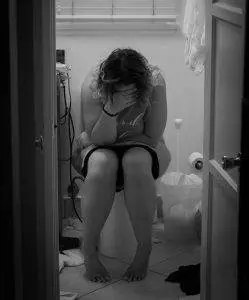
Why do I feel like I have to pee all the time? A urinary tract infection, usually referred to as UTI, is a bacterial infection that affects the bladder and/or other parts of the urinary system, causing urinary urgency, often accompanied by a burning pain when you go to the bathroom. Acupuncture and TCM is a good way to get to the root causes of frequent urination, including recurrent UTIs.
Urinary frequency, or an unusual urgency to urinate, can be caused by several different health conditions. A common cause of bladder pain, pressure on the bladder, or a burning sensation when peeing is a bacterial infection in the urinary tract, or UTI. But there can be many other reasons for constantly feeling like you have to pee, including diabetes, interstitial cystitis (IC), pregnancy, prostate problems, ovarian cysts, and more.
Over half of all adult women have experienced a UTI (also called cystitis) at some point in their lives. Many women get UTIs frequently, making them the most common type of non-hospital-related infection in the U.S. Up to 6% of all doctor visits are related to UTIs. A UTI can occur when bacteria, usually E. coli, gets into the urethra and travels up into the bladder, or further into the urinary tract. This can happen because of hygiene habits, after sex or exercising, or the use of contraceptives or period products. It can also happen when urine sits in the bladder for too long, or because a person has a weakened immune system.
While UTI treatment at home remedies such as drinking cranberry juice are popular, most women recognize that once they get that constant urge to pee, they have no choice but to rush to the doctor for antibiotics. Typical UTI medical treatment almost always involves confirming the infection by lab analysis, and a prescribed course of antibiotics, along with analgesic medicine (such as Pyridium) to help the UTI pain in bladder. Unfortunately, many women keep getting UTIs. Infections that are antibiotic resistant are increasingly common, and antibiotics do not get to the root of the problem.
Interstitial cystitis (IC), or painful bladder syndrome, is a condition that causes a constant sensation of having to pee, or bladder pressure, even when there is no infection present. Recurrent UTI and IC are a significant source of anxiety and depression for women, as they can cause almost constant pain and an inability to leave the house due to the constant urge to urinate.
UTI in men is not as common as UTI in women. The more common cause of frequent urination in men is benign prostatic hyperplasia (BPH), in which an enlarged prostate presses on the urinary organs, blocking the flow of urine, and causing backup that can lead to bacterial urinary tract infection men.
Sometimes what feels like a UTI might be something else. Growths in the pelvic area, such as ovarian cysts, uterine fibroids, or tumors can cause pressure in the bladder, bladder pain, or urinary frequency at night. Even when there is no infection, there may urinary symptoms such as:
- Strong urge to pee frequently (more than 8 times per day)
- Difficulty urinating
- Urine is different color than usual
- Pain during peeing, or burning sensation when peeing
- Nocturia, frequent urination at night
The conventional medicine answer to UTI is antibiotic treatment, but this is not the only answer for everyone. TCM methods of acupuncture and herbs can help with improving the function of bladder and kidney systems, reducing symptoms from recurrent UTIs, as well as helping to address the deeper problems that cause inflammation and pressure in the bladder.
Top 10 Urinary Frequency Causes
There are many possible causes of frequent urination.
- UTI (urinary tract infection, also called cystitis, or bladder infection)
- Kidney infection – when bacteria move further up into the urinary tract, the kidneys can become infected. Sometimes people with nerve damage in the spine cannot feel UTI symptoms (neurogenic bladder), so the infection becomes more widespread.
- Bladder stones – when the bladder does not empty completely, urine can crystallize and form hard stones, causing pain during urination.
- Interstitial cystitis (painful bladder syndrome) – a syndrome of urinary pain symptoms, the exact cause of which is unknown. Inflammation of the bladder lining may be due to trauma (from surgery or delivery/birth), overdistension, or dysfunction of the pelvic floor muscles.
- Prostatitis – inflammation of the prostate accompanied by irritation of the nerves in the area; not necessarily an infection, although a bacterial infection of the prostate can occur.
- Urinary incontinence – leakage of urine, occurs when the urethral sphincter that controls the flow and stoppage of urine is weak. More common in women and older people.
- Vaginitis – inflammation of the vagina, usually due to infection. Candida, or yeast infection, is one type of vaginitis.
- Diabetes – can cause a variety of urinary problems, due to the body producing more urine to process blood sugar, and nerve damage that leads to urinary retention and incontinence. Constant thirst is also a sign of diabetic urinary symptoms.
- Side effects of cancer treatment in pelvic area – cancer treatments that affect the pelvis, including radiation, chemotherapy, immunotherapy, and surgeries to remove pelvic organs, can all cause irritation or damage to the bladder.
- Overactive bladder (OAB) – a group of symptoms, including frequent urination, leakage, nocturia (getting up to pee at night), and primarily, a strong urge to urinate often. Considered to be caused by inappropriate signalling of the nerves that communicate between the brain and the urinary tract organs.
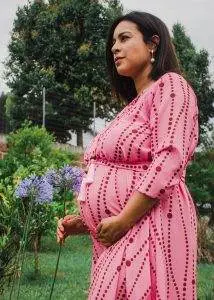
Causes of frequent urination vary somewhat according to biological sex. Frequent urination in men is often caused by prostate problems, while frequent urination in women may be due to pregnancy or other womens’ health conditions related to the ovaries or uterus.
Pressure on the bladder because of pregnancy, or from other organs, can also cause urinary frequency and discomfort. This can happen due to an anterior prolapse, when the pelvic floor is weakened, and the uterus, intestine, or bladder drop from their normal position. When a woman is pregnant, the heavy uterus often causes more frequent urination, or, in some cases, urinary retention. Damage or trauma to the pelvic floor can occur during delivery, so many women experience weak pelvic floor muscles, prolapsed uterus or bladder, and ongoing urinary urgency after they have had a baby.
In men, an enlarged prostate or prostatitis (infection and inflammation of the prostate) can put pressure on the bladder and other parts of the urinary system.
A frequent need to pee can also be caused by drinking too much coffee or alcohol, or taking diuretics.
Can Acupuncture Help Frequent Urination?
In Chinese Medicine, urinary problems come under the classification of “Lin Syndromes.” Lin disorders generally involve painful, “dribbling” urination and are caused by disharmonies in the Bladder and Kidneys, as well as involving other major organs like the Heart, Liver, and Spleen. Dampness and Heat are the primary pathogenic factors, so we use acupuncture treatment and herbal formulations to clear heat and dampness from the body.
Top 5 TCM differentiations of UTI:
- Damp Heat – characterized by frequent urination, burning sensation when peeing, painful pressure in bladder, dark urine or cloudy urine that smells unusual, feelings of nausea, bitter taste in mouth
- Heart Fire – frequency and urgency, thirst, hot, red face and chest, trouble sleeping/insomnia, irritability, anxiety, heart palpitations
- Liver Fire – excess heat causes painful burning during urination, headaches, ringing in ears/tinnitus, constipation, feelings of anger and frustration, redness in eyes and face.
- Fatigue Lin – covers urinary disorders that involve incomplete emptying of the bladder, due to prostate enlargement or prolapsed pelvic organs.
- Stone Lin – obstructions of the urinary system due to buildup of minerals that create stones in the bladder, kidney stones, etc.
Patients who have problems with recurring UTIs may be resistant to the antibiotics they’ve been given. TCM herbs can be used as an additional or alternative remedy from antibiotics and help to strengthen the immune system overall. One review of studies involving the use of Chinese herbal medicine (CHM) for UTIs concluded that the herbs, whether used alone or in conjunction with antibiotics, worked better than antibiotics alone.
One study showed that women who were prone to getting UTIs who were treated with acupuncture as preventative care only got a UTI one-third as often as women who didn’t receive acupuncture. Acupuncture has also been shown to be highly effective for bladder pain due to interstitial cystitis. Studies have also shown that TCM treatment can relieve the blockage of urine caused by an enlarged prostate (BPH).
Top 5 Tips for Preventing UTI

What a relief! Now that you’ve gotten over that urinary tract infection, it’s important to take steps to prevent getting another UTI. Here are some natural ways to prevent UTIs:
- Drink more water – This may seem counterintuitive, as you don’t want to have to pee even more. But you do want to be constantly flushing bacteria out of the urinary tract. Avoid drinks like coffee and soda, which can be irritating to the bladder.
- Go when you feel you need to – Some therapies for overactive bladder or IC involve training yourself to hold urine, but for most people, this is not a good idea. Retaining urine for too long contributes to bacterial growth and causes overdistension of the bladder.
- Hygiene – be sure to wipe from front to back when you go to the bathroom. Change clothes and underwear often, especially after sweating. During your menstrual period, change your pad and tampon frequently.
- After sex – always go to the bathroom and urinate before falling asleep.
- Avoid chemical products – Avoid using deodorants, douches, or scented wipes around the genital area. Consider whether contraceptive products like spermicides might also be part of the problem.
Acupuncture Near Me for UTI
While it is rare for a UTI to become so serious that you have a fever or become nauseated, urinary problems should be taken seriously before they become worse. If your UTIs keep coming back, or you constantly feel like you have to pee, it may be a sign that there is something deeper going on. As people age, urge incontinence, prolapsed organs due to weak pelvic floor muscles, and nerve damage can lead to more serious bladder problems. TCM provides a holistic way to treat urinary tract issues, as well as other, possibly hidden conditions in the pelvic region. Urinary urgency may be a signal of something else, so don’t ignore it. Consult with your acupuncturist to find urinary frequency relief.
*This article is for education from the perspective of Traditional Chinese Medicine only. The education provided by this article is not approved by FDA to diagnose, prevent, treat and cure human diseases. It should not stop you from consulting with your physician for your medical conditions. Traditional Chinese Medicine is based on Qi, which is an invisible force that usually cannot be observed by modern science. Because science focuses on testing ideas about the natural world with evidence obtained through observation, these aspects of acupuncture can’t be studied by science. Therefore acupuncture and Chinese herbs are often not supported by double-blind, randomized trials, and they are considered alternative medicine therapies in the United States.